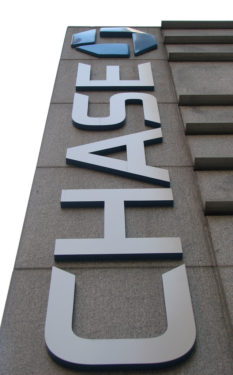Monthly Archives: November 2016
Back home, there used to be a bank that I’ll call GoUSA Federal Bank. It was a pretty big operation that existed locally but not really nationally. They were really everywhere, which was a big plus back when using ATMs was a regular part of banking. They also had really low minimum balances, free checking, and you could pick your own credit card design, which at the time was novel. Options were limited, but you could get a US flag, your state flag, or an eagle. Impressive stuff.
It was the ubiquity of their ATMs that had my interest, because my own bank had four in the entire city of Colosse, the nearest a half-hour from the Southern Tech campus. So I figured that I would get an account with them. But when I brought this up with people who had an account with them, they uniformly warned me against it. GoUSA was terrible, they explained. They had an incredible number of ridiculous surcharges and little in the way of monitoring. So you could use your debit card as much as you wanted, but if you passed $100 a month, you’d get hit with a $35(!!!!) penalty. And you had no way of knowing how much you’d used it.
Still, nobody switched away from them or anything radical like that. Their ATMs were all over the place. Plus, a credit card with an American flag on it.

Photo by epicharmus 
Manhattan? Manhattan.
If there was a way to emphasize that they were a far away entity with little interest in the local more effective than that, I cannot imagine what it would be. I mean, even California something-or-other wouldn’t have been great, but Manhattan was New York and (at least back then, pre-9/11 and all that) it was our duty really to just hate on New York. And so here come these yankees buying off our beloved little ragtag band of thieves bank and probably laughing at us and thinking they’re better than us.
Oh, and they also got rid of the customized credit cards. Now, instead of having the good ole star-spangled banner, they had… the New York Skyline. Because of course they did.
My then-girlfriend Julia’s family banked with them and I remember being in the room when he was on hold with customer support wanting to get his new credit card changed out for one with an American Flag on it.
It blew over after a while. Julia’s family did change banks. Bank of America did a big push at around that time and before I knew it, just about everyone was using them. I honestly don’t know how much of this was related to the Manhattan thing, except that BoA went to great pains to mention that they were from Charlotte at every opportunity.
Except me, of course. I stuck with my old crappy bank which at least would never have the word “Manhattan” associated with it. (A few years ago, they were bought out by BBVA, more formally known as Banco Bilbao Vizcaya Argentaria).
Sesame Street is hit and miss with its cleverness, but this one is just great.
Moral relativist Palpatine is easily the most interesting Palpatine.
It’s unfortunate that Lucas couldn’t follow through with this angle Because Bush.
Artistically, we’re in for a long four years.
There's been a shorthand version of Christmas for decades; why do I have to keep typing "Thanksgiving"?
— ProFootballTalk (@ProFootballTalk) November 23, 2016
I nominate this for the dictionary definition of #firstworldproblem https://t.co/e2HJ4HtTzm
— Asymptotic Unlimited (@AsympU) November 23, 2016
@AsympU O had the ultimate one last night. "My new Discover Card and Visa are the same color. It will be confusing. This sucks."
— Will Truman (@trumwill) November 23, 2016
@trumwill Oh no! That can be confusing. We can get a new card with a new color sent; click to chat w/us: https://t.co/kauNFmWiQM *Jess
— Discover (@Discover) November 23, 2016
As a political scientist, though, what really irks me is the bit about “The pollsters got it wrong because . . .” Off by 2%, dude! I agree that this 2% was a problem—and it was more than 2% in some key states—but, shoot, man, what kind of accuracy are you expecting here? Suppose the polls had been off by 1%? Then would that be ok with you?
As a small-d democrat, I’m also repulsed by this guy’s characterization of Republican voters (yes, they voted approx 50% Republican for the House and Senate, not just for president, also they gave Mitt Romney 48% of the two-party vote in 2012, etc.) as “an appeal to the brain’s limbic system.” {…}
This particular Hari Seldon concludes with a statement about “the electorate has concluded.” Kind of amazing how the electoral college is part of neuroscience too.
What I’m wondering is, if this was all so damn obvious, why didn’t he publish it before the election? That would’ve been much cooler.
So this happened:
President-elect Donald Trump accused the “Hamilton” cast Saturday of harassing Vice president-elect Mike Pence at a performance Friday evening after the actors called on Pence to “uphold our American values.”
“Our wonderful future V.P. Mike Pence was harassed last night at the theater by the cast of Hamilton, cameras blazing.This should not happen!” Trump tweeted Saturday morning.
I do not feel bad for Mike Pence.
The reasons I don’t feel bad for Pence is that he signed on with Trump and has some particularly bad views. I, like a lot of unclean folks, recognize that I have some “particularly bad views” as well and so there is a tendency to see ourselves in him even if we don’t like Trump. That being said, he signed on with Trump, so oh well.
Above comments refer to the booing. I think there’s a time/place argument where there’s a difference between booing at a show and booing at a rally, but it’s kind of murky. I thought the cast speech at the end was fine.
Notwithstanding the fineness of the cast speech, and my ambivalence on the booing, I believe that Donald Trump won the exchange for at least five reasons: (1) To the uncommitted, the hecklers do not come across as the good guys, (2) he wins any time the totalitarian card is pulled out on something people don’t care about, (3) Pence is not himself nationally unpopular, and (4) More important stories are being missed. Oh, and (5) increased tribal solidarity among Trump’s supporters and wobblers.
The only upshot I see is tribal solidarity among his opponents, which I don’t think was previously lacking. Maybe they helped get some of Pence’s past and/or present views on gay rights out there, though not in a way I think is especially helpful.
That being said, this is not a game-changer and is not huge. It’s indicative of potential problems, but right now it’s like a thirty yard kickoff return called back on a penalty. Not off to a good start, but life goes on.
I don’t like Donald Trump. I hope he’ll be merely a bad president and not a disastrous one. I don’t like Trumpism, either. I hope (but am not optimistic) the anecdotes of racially and sexist motivated violence are either exaggerated, reported only because they’re topical, or at least don’t represent a new trend. The night of the election I was depressed and worried. You might not believe it, but I didn’t sleep at all. Not a wink. I just lay awake in bed thinking about the future.
And yet, when people in my life criticize Trump or his supporters, I get very defensive for some reason. By “people in my life” I mean family members, close friends, coworkers, and people on the blogosphere. Even my belief that we do indeed need to understand our opponents represents a certain defensiveness because my go-to (with some past exceptions) is usually to understand Trump supporters or non-liberals in general and not to understand the liberals who oppose Trump.
Perhaps some of this has to do with “flippism,” an idea I got from Jaybird, a commenter Over There. In relevant part,
It’s the basic idea that if you don’t know which of two choices are before you, you should flip a coin. Not because you should do what the coin says, mind, but because the moment the coin is in the air, you’re a lot more likely to say “OH I HOPE IT’S HEADS” at which point you’ll know which choice you actually prefer in your gut.
Then you just have to figure out how much weight to give your gut.
I bring that up because hypocrisy can work that way for people who are on the fence. Let’s say that you’re torn on a particular policy. There’s this way, there’s that way… you don’t know which is the best one… then you encounter a hypocritical politician. Are you inclined to snort and reach conclusions about all those people? Are you inclined to get defensive and start defending the guy even before you read a single attack? Well, now you know what your gut thinks.
As upset as I was about Trump’s victory, I can’t deny that somewhere in my gut I wanted him to win, if not the presidency, then at least the GOP nomination, and not in the way that some liberals wanted him to win the nomination in order to ensure a Democratic victory. In the voting booth, even though I voted for Clinton, part of me wanted to vote for Trump just to be contrarian. In Sangamon that vote wouldn’t have affected the outcome, but it’s still something I might have done.
Some of this defensiveness and “gut support” is a luxury. I’m not among the demographics most likely to be hurt by Trumpism if the worst (or even just the “moderately bad”) predictions about what it means come true. Some of it is probably also due to what my co-blogger Oscar recently described as the “-ism-lite,” which is the type of racism (and other ism’s) that are not quite as nefarious or bad as the more obvious or open kinds, but are still wrong and withal easy for its practitioners to overlook. As he puts, it instead of rejecting out of hand, “I have to parse it, process it, and then I recognize it and decide it’s not OK.”
I realize that in this post, other than noting that I do get defensive, I haven’t really explained the defensiveness or even the types of situations that elicit that defensiveness. I’m simply noting that it’s there and I’m not sure what to do with it.
I plan to write more Over There about the Electoral College (I think), but I did want to touch on a Washington Post piece arguing that two arguments in favor of it are bunk. I believe he’s wrong on the second one:
Some critics say that allowing voters to directly elect the president would splinter the two-party system. It would encourage many candidates to contest the general election, thus producing a winner with only a small share of the vote.
This is also wrong. In a system of direct election, potential candidates risk their political futures by running against the official party nominees. And there is no compensation. You win nothing by coming in third. So there is little incentive to run.
By contrast, the electoral college encourages third parties, especially those with regional bases, because by winning a few states they may deny either major-party candidate a majority of the electoral vote. You can come in third and still win a prize. Such a result was certainly the goal of Strom Thurmond in 1948 and George Wallace in 1968. Imagine giving these racist candidates leverage to negotiate with the leading candidates before the electoral votes were officially cast.
Now, I would favor replacing the electoral college with a national popular vote (and yes, did so prior to this election). But a plurality-based national popular vote really is a problem, and precisely for the reason being “debunked.”
There are two kinds of third-party candidates. First, there is the regional third-party candidate and the national. He points out Strom Thurmond and George Wallace, but those are somewhat outdated exceptions. The closest we’ve had since is Evan McMullin, and he never got as much attention as Gary Johnson this cycle. McMullin did make the argument that if the election can be thrown to the House then he can win it in the House, but that was never a viable argument. Rather, winning Utah was mostly seen as a benchmark of success. There are other benchmarks for the other kind of candidate.
The second kind of candidate is the more common kind: The national third-party candidate. Gary Johnson, Ralph Nader, Ross Perot, John Anderson, and more. All of these people are more recent than Edwards’s example. None of them had all that much success, but a part of that is attributable to the electoral college itself. At some point, though, it becomes apparent that the bar for winning is so high for them so as to be impossible. They could win the popular vote but still lose the election because how do they get to 270? Contrast this with governor races, where candidates can and do get a plurality and often get much larger chunks of the vote when they don’t. It’s easier to run for governor than president, of course, but the complete absence of a path to the White House scares off potential investorscontributors and volunteers that would make a national campaign possible.
A long time ago, conservatives and anti-Trump Republicans were looking for a candidate to run a third party candidate. None was found. I don’t know if it would have been any different under a national popular vote, but I do think it might have been. There would have been a clearer path to the White House that wouldn’t have relied on renegade electors. But as my mind drifted I thought of the potential challenges for a third party, and one of the biggest by far was the Electoral College. As Edwards points out, it’s not responsible for the two-party system, but it does provide yet another firewall.
Which is, incidentally, a reason not to like the Electoral College. I support a two-party system but want the parties to be able to challenge it. The Electoral College makes that so daunting that it’s unlikely any serious effort will be made (at least at the presidential level. A First-Past-The-Post system makes it easier. Which is good! Except that it would encourage outcome distortions, which is bad!
So, contra Edwards, we actually do need some manner of dealing the plurality problem. That can be done with a separate runoff or ordered ballots or something else. Maine, which elects its governor the same way Edwards wants to elect our president, just voted to implement ordered ballots (IRV) precisely to deal with the problem he says plurality victors don’t cause.


